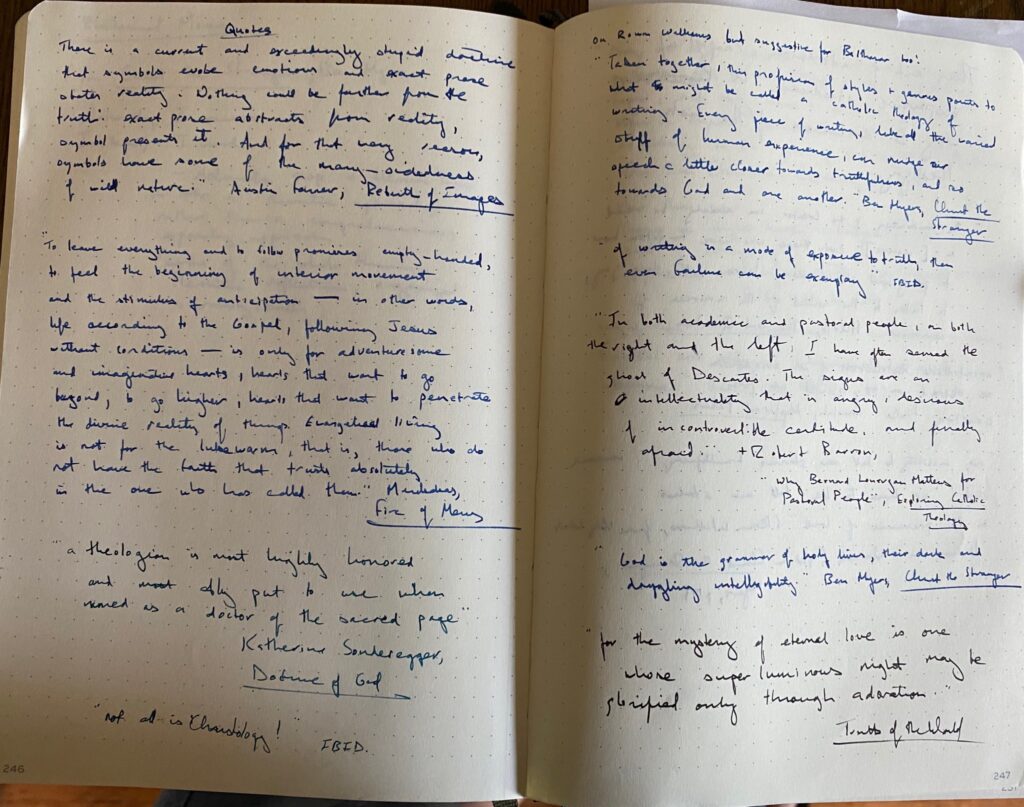For the last few years, I’ve been using the Bullet Journal system with my notebooks to organize tasks, keep my calendar, take sermon notes, write down interesting things, jot down books to find and music to listen to, etc. In every notebook I always reserve ten pages or so in the back as a commonplace book where I can collect striking quotes, phrases, and ideas. Sometimes those quotes turn into a blog post. Sometimes they make their way into sermons or other writing. But sometimes they simply sit there, waiting for me find them, to be struck again by their beauty, to ponder their strangeness, to be challenged, or to wonder what possessed me to write it down in the first place!
As I’ve written before, a commonplace book is a great way to collect and capture quotations in one place. It also provides a snapshot of recurring themes and preoccupations over the lifespan of the notebook. If you look at the tags for this blog, you will not be surprised to see that the quotes are often about contemplation, beauty, the vocation of theology, and the necessity of Christian holiness.
This is what this looks like in my notebook. Good luck reading it! I like to write with nice pens, but that doesn’t mean that my handwriting is worthy of the pens I use!

(In case you are interested, I typically use the Leuchtturm 1917 notebook with the dot grid. These notebooks are especially suited for strict users of the Bullet Journal system, because the pages are numbered and there is a table of contents in the front where you can “index” your entries. But I have not been very diligent about keeping an index, and I like writing with fountain pens, so I am switching to this Rhodia notebook. The Leuchtturm works well with fountain pens, but Rhodia paper offers a completely other level of quality. If you want a great starter fountain pen, I especially like the Kaweco Sport. If I’m going to take the time to write things in my commonplace book, I want a good writing experience.)
When I finish each notebook, I like to also capture some of the best quotes here on the blog. Here are a few highlights from the notebook I just finished:
First, some obligatory Balthasar quotes:
“Let us go forth to behold ourselves in your beauty.” HUvB, The Glory of the Lord, vol. 3
“I have to say that for me the only truly interesting theologians are the saints: from Irenaeus through Augustine to Anselm to Bonaventure or figures that allow the radiation of holiness to show forth, such as Dante or Newman; one could also mention Kierkegaard or Soloyvov. I have actually never written because I wanted to achieve results, but in order to show individuals something that I think must be seen.” HUvB, from the interview “Spirit and Fire”
“Only an eye serenely at rest sees eternal patterns and intimations in earth’s passing forms, and only such an artistic eye can show in symbol what the world is capable of revealing to the gaze of contemplation.” HUvB, “On the Christian’s Capacity to See”
Other quotes on theology:
“A theologian is most highly honored and most ably put to use when named as a doctor of the sacred page.” Katherine Sonderegger, Doctrine of God
“Not all is Christology!” Katherine Sonderegger, Doctrine of God
“If writing is a mode of exposure to truth, then even failure can be exemplary.” Ben Myers, Christ the Stranger
“God is the grammar of holy lives, their dark and dazzling intelligibility.” Ben Myers, Christ the Stranger
“Only if there is…astonishment…can there be serious, fruitful, and edifying Christian thought and utterance.” Barth, CD IV/3



